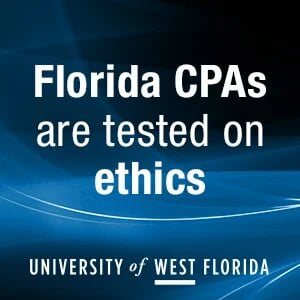One of the key traits of a professional is adherence to a rigorous set of ethical guidelines. When someone veers too far from ethical standards, their trustworthiness and ju dgment come into question.
dgment come into question.
Set Expectations
In the accounting profession, many organizations publish their own ethical guidelines. The codes of ethics and professional conduct from the Association of Certified Public Accountants (AICPA), the Chartered Institute of Management Accountants (CIMA) and the Institute of Internal Auditors (IIA) share several commonalities.
Some ethical codes, like the IIA’s, are succinct; others, such as the AICPA’s Code of Professional Conduct, are hundreds of pages long and require not only agreement for membership in the organization but also initial and periodic ethical examinations to maintain Certified Public Accountant (CPA) licensure.
Many states also enforce their own codes of professional ethics. State mandated ethics courses and examinations seek to ensure that CPA candidates and practitioners understand the state’s licensing requirements and other principles for recognition as a CPA in that state. For example, the study of ethics in accounting is part of Florida’s continuing professional education requirements for CPA license renewal under state statutes.
Purpose
Accountants deal with the intimate financial details of individuals and organizations. Some have the ability to execute million-dollar transactions, and others assist with safeguarding retirement funds of cab drivers and social workers.
Ethical codes are the fundamental principles that accounting professionals choose to abide by to enhance their profession, maintain public trust and demonstrate honesty and fairness. People who join organizations and secure the credentials to present themselves to the public as CPAs or Certified Internal Auditors (CIAs) strive to protect the reputation of the profession.
Sadly, not everyone who works in the accounting field is trustworthy. Daily violations of public and private trust occur, and resolving ethical dilemmas does not always end favorably. The following are five areas that deserve the attention of anyone considering working in the accounting profession.
- Independence and Objectivity
Ethics and independence go hand in hand in the accounting profession. A critical component of trust is making unbiased decisions and recommendations that benefit the client. Conflicts of interest, for example, demand exposure under independence guidelines. Benefiting from the sale of one financial product over another could lead to a bias that skews financial advice to a client.
To remain objective and independent, it is also necessary to ensure that recommendations are not subject to outside influence. An accountant’s professional judgment is compromised if they subordinate their judgment to someone else’s.
- Integrity
Demonstrating integrity means being straightforward and honest in all business and professional relationships. Upholding integrity requires that accountants do not associate themselves with information that they suspect is materially false or misleading — or that misleads by omission.
- Confidentiality
Disclosure of financial information or revealing the disposition of a potential merger by an accounting professional without express permission violates the trust that is the foundation of a professional relationship — unless there is a legal or professional reason to do so.
- Professional Competence
The field of accounting is regularly disrupted by various evolving factors, requiring that accountants develop new skills, competencies and agility in professional roles. As technology, information security considerations, legislation and best practices change, a professional accountant must remain up to date. To exercise sound judgment, an accountant must stay abreast of developments that could affect a decision’s outcome.
Practicing due care means recognizing your skill level and not suggesting that you have expertise in an area where you do not. Consulting with other professionals is a standard practice that helps to bond a network of individuals and generate respect.
Similar guidelines also apply to accounting professionals who have risen to leadership roles and supervise others. These accountants must ensure that the subordinates receive proper training and guidance as they carry out their responsibilities.
- Professional Behavior
Ethics require accounting professionals to comply with the laws and regulations that govern their jurisdictions and their bodies of work. Avoiding actions that could negatively affect the reputation of the profession is a reasonable commitment that business partners and others should expect.
Dilemmas and Case Studies
Most of the situations that people encounter every day result in clear outcomes that anyone following these five guidelines would expect. However, ethical decision-making is not always cut and dried.
- When a subpoena arrives requesting a client’s personal financial records, should you surrender them?
- The CEO tells your staff member to apply a credit from an overpayment on one account to a disputed account, should you allow it?
- If a sale at year-end occurs but is not executed before the cut-off date, should the revenue be recorded in the current or prior year? What if the goods were in transit? What if there was an oral agreement but not a signed contract?
- If your boss, another CPA, instructs you to record the transaction in the earlier year, what should you do?
Plus, financial considerations, government support, ongoing uncertainty and other factors surrounding the COVID-19 pandemic have compounded ethics pressures and dilemmas faced by accountants. There can be more questions than answers in these situations. Codified ethical principles help guide such challenging decisions — as does ongoing professional development and financial research.
Black and White
Blatant fraud, theft and corruption may make better movies and front-page news stories, but accountants’ daily work involves much more subtle ethical situations. Decision-making doesn’t always come down to “yes” or “no.” The fine line between the two is subject to interpretation and will make up the bulk of the encounters that accountants face during their careers.
Ethics in accounting includes both strict adherence to guidelines and careful assessment of unique situations where professional judgment is necessary. Understanding the ethical frameworks for independence, integrity, confidentiality and professional competence can guide decision-making and help preserve the reputation of the field.
Learn more about the UWF online MBA in Accounting program.


